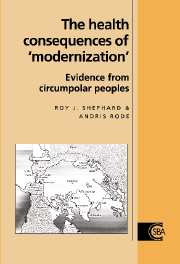Book contents
- Frontmatter
- Contents
- Preface
- 1 The circumpolar habitat and its peoples: traditional lifestyle and early research findings
- 2 Concept of the International Biological Programme Human Adaptability Project, and IBP studies of circumpolar populations
- 3 Changes in social structure and behaviour
- 4 Secular trends in diet, metabolism and body composition
- 5 Secular trends in physical fitness and cold tolerance
- 6 Secular trends in respiratory hazards, lung function and respiratory disease
- 7 Secular trends in growth and development
- 8 Current health status of circumpolar populations
- 9 Postscript: lessons from traditional circumpolar life and options for the future
- References
- Index
9 - Postscript: lessons from traditional circumpolar life and options for the future
Published online by Cambridge University Press: 05 March 2012
- Frontmatter
- Contents
- Preface
- 1 The circumpolar habitat and its peoples: traditional lifestyle and early research findings
- 2 Concept of the International Biological Programme Human Adaptability Project, and IBP studies of circumpolar populations
- 3 Changes in social structure and behaviour
- 4 Secular trends in diet, metabolism and body composition
- 5 Secular trends in physical fitness and cold tolerance
- 6 Secular trends in respiratory hazards, lung function and respiratory disease
- 7 Secular trends in growth and development
- 8 Current health status of circumpolar populations
- 9 Postscript: lessons from traditional circumpolar life and options for the future
- References
- Index
Summary
In most parts of the arctic, the traditional lifestyle of indigenous populations can no longer be sustained in the face of a rapid natural increase in the population and commercial exploitation of the circumpolar habitat by the multinational corporations of ‘modern’ society. This final chapter will highlight a few valuable characteristics of the traditional northern heritage that merit preservation. It will review desirable future adaptations of indigenous circumpolar society, and will draw some lessons for sedentary city-dwellers, health professionals and indigenous populations that have colonized other habitats.
The heritage of traditional circumpolar life
A heavy use of imported technology, fossilized carbon energy and other material resources allows the city-dweller to exploit the coldest parts of the arctic, regions that destruction of the natural flora and fauna has made uninhabitable for the first nations. Perhaps for this reason, temporary arctic sojourners and immigrants from lower latitudes often suggest or imply that the ways of their society are in some fashion superior to those of the indigenous circumpolar residents. As a corrective to such a judgment, it seems useful to list some important lessons that ‘developed’ societies could learn from indigenous populations. Accumulated knowledge and behavioural adaptations have allowed peoples with no great inherent biological advantages to colonize one of the earth's least promising regions, and to succeed in their endeavour without recourse to the technological props that the ‘modern’ city-dweller finds so essential when venturing into the arctic.
- Type
- Chapter
- Information
- The Health Consequences of 'Modernisation'Evidence from Circumpolar Peoples, pp. 251 - 263Publisher: Cambridge University PressPrint publication year: 1996



